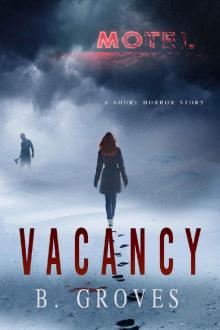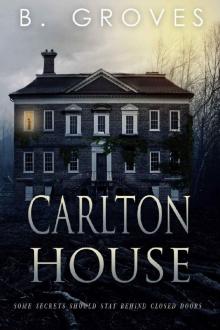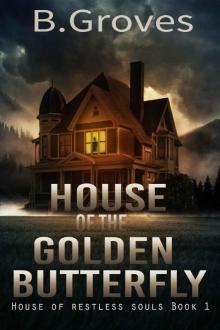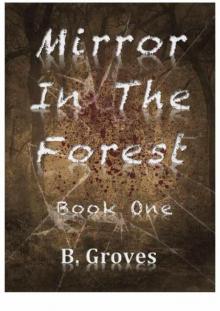House of the Golden Butterfly Read online
Page 2
“She seemed okay to me,” Claire mumbled. “In her right mind.”
“Yeah, well, she spouted off to me last week, so it’s nothing. If it was something important you would know,” Ben said giving her a reassuring smile.
Claire tried to hide her frown and turned to face her grandmother one more time before the service started.
It wasn’t long before she walked to the podium to deliver her eulogy. The words of her grandmother nagging at her mind.
3.
Lingate, North Carolina
W illiam McIntosh drove over the hills and through residential neighborhoods thinking about his shift ending. He glanced at the digital clock on the dashboard of his cruiser and groaned. It was only 2:30 pm. He had another two hours before his shift ended on the hot July day.
Lingate… Your gateway to the Great Smoky Mountains.
Lingate had seen a revival in the last twenty years, with downtown remodeled into a modern Art Deco style that attracted many visitors and transplants from all over the United States, and even the world.
William—Mac for short—barely recognized his hometown anymore, but the booming economy kept his job secure.
As a police officer, it made him happy since the budget from the state kept Lingate going as a premier tourist destination. That meant modern equipment and job security.
He received his new patrol car after his old one racked up over 500,000 miles and kept breaking down. No amount of patchwork could keep that old clunker on the road, he thought with a chuckle. He missed that piece of shit, though.
Lingate was the type of town that attracted all kinds of people, from starving artists to retirees. Some longtime residents enjoyed the changes, others… well… not so much. He heard the bellyaching about it daily on his morning visit to the local hangout while picking up his coffee.
Mac turned a corner to stop at one of the newer gas stations. His eyes scanning the area watching the customers moving in and out of the convenience store before he exited his car to grab a bottle of water.
His thirst wouldn’t be quenched. The dispatcher called his number through the crackling of the radio.
“Dispatch to 109, come in,” The dispatcher said.
Mac picked up the microphone to speak. He didn’t know why but his gut flared up inside his stomach.
“This is 109,” Mac answered.
His senses heightened waiting on the dispatcher to answer him. It could be an accident, a robbery in progress, you never knew anymore, and with the United States in political upheaval, police were using extra caution nowadays when answering emergency calls.
“Mac, can you answer a welfare check?” The dispatcher asked making Mac smile because Chief Biggs always tried to keep their workplace informal and relaxed.
The balloon in Mac’s gut deflated. Those were easy calls. Most of the time, family members called in to check on elderly loved ones, and most of the time they were safe and sound, forgetting to charge their phone, angry with their children, or forgetting to turn up their hearing aids.
“What do you got?”
“A neighbor has been driving by 134 Linda Street, and says the mail is piling up in the mailbox,” the dispatcher answered. “He drove down the driveway and found a vehicle sitting there with weeds sprouting around the tires.”
The balloon of dread inflated in Mac’s gut once again when he heard the address.
Wait… 134 Linda Street?
“Isn’t that Kinsey House?” He asked.
A moment of silence and then his answer. “It sure is.”
Mac confirmed and started his patrol car leaving the convenience store behind. He was about ten minutes from the Queen Anne style home and the eccentric old woman who lived there.
Rose Kinsey lived in Lingate her whole life. Mac was too young, but from what other town elders said she was once the bell of the ball per se. Every man worth his salt in town wanted to marry Rose. Mac couldn’t remember her maiden name, but her family had money and would only accept the best for their daughter.
She married Arthur Kinsey, and they had a daughter named Janie if he remembered correctly. Arthur was mayor of Lingate a long time ago. He died in a skiing accident in Colorado while he was serving as mayor.
Mac remembered Janie dying with her husband in a freak car accident years later. He remembered hearing about Rose raising her grandchildren—or, grandchild, he wasn’t sure—when the little boy went missing in the Three Forks River. The boy was never found. That was all Mac knew about the family’s history. They said Rose went mad from losing her whole family. She became withdrawn from her social circles. She never again accepted social invitations and would drive to town only to pick up groceries and run other errands.
Most people feared her because if they made her angry her temper flared, and they could look forward to a tongue-lashing from the old woman.
The longtime residents would warn the newbies, if you see Rose Kinsey look the other way. If you do any work for Rose Kinsey, give her whatever she requested no matter how crazy it sounded.
Mac saw her driving around town all the time. She was a harmless eccentric old woman, who never intended to hurt anyone, except with her mouth.
He thought he saw her two weeks ago, walking with a cane into the grocery store. Her hair perfectly coiffed, her clothes immaculate, and her head held high in a dignified manner.
He smiled thinking if old Rosie was okay, he’d be another person to receive one of those tongue-lashings.
Mac turned onto the street that Rosie lived. This street hosted old mansions and historic homes.
Most were hidden behind thick forests or blocked off with wrought iron gates. This part of town came from old money. Homes for families who made their riches in the big cities but moved to the country with the promise of a simpler life. Lingate’s founder—Charles Lingate’s home—was a few more miles down the road and considered a nationally registered historical site and tourist attraction.
Other homes were from the civil war era and used as beds and breakfasts, some hosting tours for history or ghost hunting.
Mac drove through the thick-forested road and saw the mailbox. The neighbor was right, the mailbox had unopened letters peeking over the lid.
Mac turned into the driveway, and the dread snaked out from his stomach all the way through his chest and into his limbs.
He hoped for a second her car wasn’t in the driveway, but there it was, sitting in front of the house.
The dirt driveway opened into a clearing where the house sat, and Mac gazed in awe of the three-story home.
It was rundown, but with a paint job and some new shingles, the house would return to its old glory.
He stopped the cruiser in front of the car and got out.
His eyes darted around looking for any movement through the windows. He heard Rosie wore hearing aids, but she might not be wearing them now.
He spotted a light shining through one of the second story windows, and that gave him hope. He listened for strange sounds, but all he could hear was birds chirping in the distant woods, and a car passing by on the street.
The three-story gray house with the polygonal tower loomed over Mac as he walked from the cruiser to the front door. He turned down his portable radio when the static came through of other officers responding to other calls.
The third floor had a pyramid-shaped frame over the top window that had to be the attic, he thought. He could make out two brick chimneys rising into the air. One on each side of the house.
On the second floor was a balcony stretching over the front door with double doors closed, and Mac could see lacy curtains covering the full-size glass inside the frames.
Mac stepped onto a wrap around porch making the wood protest beneath his booted feet. The porch’s wood was rotting in some areas from neglect. Most of the paint had peeled away to expose the wood underneath. The spindles were splitting in two from lack of care.
He noted the outdoor plants were wilting in their pots from
neglect.
Mac closed his eyes as that sense of dread ran through his body making his limbs tingle.
Mac thought an ice cold blast of air hit him from his right then ran down his spine.
He wanted to put his arms around his chest, as the cold seemed to seep through his uniform, through his skin, and into his bones.
It can’t be turning cold now. The last he checked, the temperature was pushing 95 degrees with the humidity promising nasty thunderstorms later in the evening.
He shivered again, trying to shake the chill that covered his body.
He faced the front door again and thought there’d been a moment of silence. No noises. No animals running around in the nearest forest, no birds crying out as they flew from their nests in the trees.
Nothing. Only silence.
The air was heavy around him. He thought a weight slammed into his chest, and he had a hard time breathing.
He wondered if he was coming down with a cold. Why was this happening?
The front door blurred. Mac had to blink several times and shake his head as a wave of dizziness passed through him.
Mac caught the doorframe trying to steady himself. He gripped his chest wondering if he was getting sick as sweat formed on his brow.
He blinked again and found the air returning to the normal hot and humid. His breathing calmed, and the weight lifted from his chest.
The dizziness and nausea finally faded. Mac knew the world was returning to normal when he heard a flock birds fly overhead.
Mac stepped back, his eyes wide from confusion from what happened.
How much time had passed? He’d been standing the porch and hadn’t even knocked on the door yet.
Whatever happened to him, Mac thought he ought to drive to an urgent care after work to see if he was coming down with something.
Mac turned his gaze to the left. He couldn’t believe his eyes.
The curtains from the big window had been pulled away. Had they been like that before? He couldn’t remember from the few minutes where he was feeling sick.
Mac placed a hand over his temple trying to gather his bearings and trying to clear his foggy mind.
Why couldn’t he remember?
He shook his head and rubbed his watery eyes when the scent hit his nose.
Yes, those smells were that powerful. Mac closed his eyes, trying not to inhale deep breaths.
“Shit,” he muttered.
Taking about five steps to his left, Mac placed a hand over the huge bay window to cover the light and peer into the front room.
Mac expelled a breath, stepping away from the window. With shaking hands, he called into dispatch to bring back up.
4.
T wenty-nine-year-old Claire Westcott turned to the clock with its tick-tick-tick of the second hand taunting her from the wall. It was 1:30 AM and for the last four hours, all she’d been doing was staring at the white computer screen as the words—yet again—failed to come through her fingers onto the keyboard.
She cursed her writer’s block and cursed authors who said writer’s block didn’t exist. Or maybe the well in her brain was running dry of ideas, she wasn’t sure anymore.
The little black cursor blinked at her on the screen as if to mock her for not moving it the whole evening.
Claire turned her gaze from her computer screen and gazed at her empty glass of wine. If she didn’t produce something soon her publisher would drop her.
It’s not like she made a good income from her publisher or any other freelance work she’d done.
Her royalties were minimal, and if she was lucky to make any list, it didn’t last since her publisher was small and the big guys still dominated the market.
Claire scoffed, glancing at the clock again. If she didn’t produce new content soon, then she would be searching for another job to pay the bills.
Come on, she thought, how often can I write the same bullshit in every single book? A gorgeous guy. Check. A beautiful heroine? Check. A happy ending? Check. Why was it always the same formula?
She wrote contemporary with some suspense in the mix. A romance novel was always a hot seller, but with her own love life dead in the water, she despised writing those final scenes where the couple spoke sickly sweet words and gazed into each other’s eyes.
It made her want to gag whenever she typed the words on the screen.
How long has it been since she’d been on a date?
It’s not that she didn’t appreciate her own fandom. She did. She loved her fans. The wonderful notes they left her for reviews were worth the work, but Claire wanted to explore other avenues of the writing world.
Well, those other avenues were not what her publisher wanted, and what she couldn’t afford to do.
She’d thought about taking the road of self-publishing, but she couldn’t even afford to buy back her work let alone venture out on her own.
Claire was stagnant. Her work was stagnant. She needed a change. She needed inspiration. She needed adventure and excitement to resurrect her stale writing career.
She needed to change not only her career but her personal life.
Claire glanced over at the pictures of her family and then her dog.
They’re all dead.
Her biggest supporters buried or ashes sitting on her desk in a tiny urn.
Claire blinked back her tears. Her grief over losing both her grandparents still tore a deep hole in her chest day after day.
Gaia—her best doggy friend—was blind and deaf by the time she passed, but she was always at Claire’s side and never complained no matter how hard it was getting for her to climb the steps to Claire’s apartment.
Claire turned her gaze to the spot she found Gaia that morning not long after her grandfather passed away.
No matter how hard she tried, she couldn’t bring herself to adopt another dog. Nana told her she would need to move on with her life, but Claire couldn’t do it.
Claire pushed away her empty wine glass. She then closed the screen to her laptop with a loud thwack from frustration.
Her grandparents never had much money, so Claire never knew what it was like to rely on disposable income. Her grandparents paid for her schooling. They told her to not question where the money came from. All her needs, while she attended college, were taken care of.
Clay taught her that hard work pays off, but she had doubted the advice for a long time, although she never shied away from hard work. The last time she needed to supplement her income, she worked at Home Depot for a year along with becoming a waitress part-time at a local diner.
“That’s how you learn about life,” he’d say.
He was so right. She wished more people her age had the values that her grandparents instilled in her.
The town was quiet now since all the tourists had gone home for the season, and the only other event coming up was the annual Irish Festival.
Claire looked forward to that. The people and the festivities might kick-start her fledgling writing.
She stretched her stiff legs and turned off the lights. Even her dreams were stagnant.
***
The cell phone rang, bringing Claire out of a dreamless sleep. She turned over, having a hard time opening her eyes. It was her fault. She stayed up too late and drank too much wine—again.
She hoped the phone call wasn’t her agent. Claire turned back over and saw the digital clock read 9:20 AM.
She hadn’t meant to sleep this late. It wasn’t like her to do that. She was a natural early bird. She liked getting up at the crack of dawn, standing on her small balcony to watch the sunrise over the ocean while she sipped her morning coffee. They had done that many mornings after Claire moved back to southern New Jersey when she was fresh out of school, and she vowed to continue the tradition after Nana passed away.
The bright fall sunshine peeked through her blinds. Claire had to blink a few times to adjust to the light.
Her coffee maker was on the two-hour timer and set for 5
AM. That meant the coffee was ice cold by now.
Claire groaned and turned over not caring about who was on the other side of the phone call.
Screw it, she thought. I will sleep all day.
The phone beeped with a voicemail.
Claire did not want to listen to it. She wanted to go back to sleep, but the reminder beep ordered her to look at it.
Claire rolled over and threw off the quilt and sheet. She picked up the phone from her bedside table and gazed at the phone number on the screen.
Lingate, North Carolina, it read.
“Who is calling me from Lingate?” She asked the empty air around her.
She hoped it wasn’t another bill collector. Nana’s cancer treatments had been costly even with supplemental insurance. She thought she’d taken care of everything.
Claire sat up at the edge of the bed and took a deep breath. She pressed the voicemail and listened to the message.
The man’s smooth southern accent came through the recording. All she heard was lawyer—wait—what?
His next sentence mentioned Rose Kinsey passing away.
Rose Kinsey?
She passed away in July, and the house and an inheritance were bequeathed to Claire Westcott, her granddaughter.
Huh? Her grandmother only recently passed away? Claire thought she died a long time ago.
“I’ve been trying to track you down. Your publisher gave me your contact information,” he said.
“You can call me at this number. I will be in my office all day today. Have a nice day, Miss Westcott.”
Claire pulled the phone from her ear. She stared at the screen as it changed from black to the picture of her grandparents for her wallpaper.
What was this attorney talking about?
Who was he?
Claire blinked when a flash of a picture entered her mind.
“Mom-mom.”
The voice was hers from when she was a child.
Claire jerked from the memory. She shook her head, trying to comprehend the news from the attorney who left her a message.

 Vacancy
Vacancy Carlton House
Carlton House House of the Golden Butterfly
House of the Golden Butterfly Mirror in the Forest: Book One
Mirror in the Forest: Book One The Soul Healer
The Soul Healer